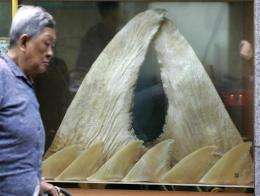Cathay bans shark fin from cargo flights

Cathay Pacific said Wednesday it would no longer carry unsustainably sourced shark products on its cargo flights, dealing a blow to Hong Kong's huge shark fin industry.
Environmental groups welcomed the move but shark fin merchants said it threatened their livelihoods, even though most of the estimated 10,000 tonnes of fins Hong Kong imports annually comes by ship.
"Cathay Pacific has decided to stop shipping unsustainably sourced sharks and shark-related products," the airline said in a statement.
"There is very compelling scientific evidence to support that this is the right thing to do for a company committed to sustainability.
"Specifically, due to the vulnerable nature of sharks, their rapidly declining population, and the impacts of overfishing for their parts and products, our carriage of these is inconsistent with our commitment to sustainable development."
Hong Kong is one of the world's biggest markets for shark fins, which are used to make soup that is an expensive staple at Chinese banquets.
Environmentalists say the sustainable shark fin industry is tiny and most shark products are harvested in a way that threatens scores of shark species that are deemed vital to the health of the oceans.
WWF-Hong Kong conservation director Andy Cornish said that while it was difficult to quantify how much shark fin Cathay carried, the ban was "fantastic news".
"I think the significance of this goes beyond the direct impact of any unsustainable shark fin they might have been carrying before. This continues the momentum of companies, particularly in Hong Kong, acting more responsibly," he told AFP.

Cathay said it had studied the issue for a "very long time" before siding with conservationists who have long been calling for curbs on the shark fin trade.
"The decision had to be based on scientific data—for example, are sharks really endangered?" the airline said.
"We believe that we now have compelling evidence that the majority of shark fishing is incompatible with our position on sustainable development."
It said the new policy would take about three months to be put in place as shippers had to be notified and "appropriate procedures" established.
But no new contracts to carry unsustainably sourced shark products would be entered into, effective immediately.
Shark fin sellers condemned Cathay's decision.
"We have to put food on the table, so of course we want the shark fins to keep coming in," fin merchant Leung Wing-chiu said at his shop in an area of downtown Hong Kong where shark fins are prominently displayed for sale.
About 73 million sharks are killed every year, with Hong Kong importing about 10,000 tonnes annually for the past decade, according to environmental group WWF. Most of that is re-exported to mainland China.
The number of threatened species has soared from 15 in 1996 to more than 180 in 2010, mainly due to the growing Chinese demand for fins.
Shark fin soup is viewed by many Asians as a rare delicacy and is traditionally served at wedding parties and business banquets in Hong Kong, which handles around 50 percent of the global fin trade.
Importers and restaurants that serve the product often cite the cultural aspect of shark fin soup to justify the trade, but some surveys suggest consumers are willing to forgo their traditional delicacy.
A survey by marine conservation group Bloom last year showed that some 78 percent of Hong Kong respondents considered it socially acceptable to leave shark fin soup off the menu at a wedding banquet.
Major Hong Kong-based hotel chains Peninsula and Shangri-La have recently stopped serving shark fin at their up-market restaurants, amid signs that demand for the soup in Hong Kong is falling.
Cornish said however that demand in mainland China was rising due to the growth of the middle class.
(c) 2012 AFP

















